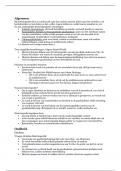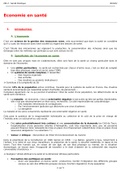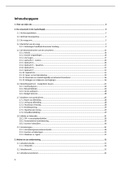1) Tutorial Q: ‘The classic account given by Dicey of the doctrine of the supremacy of Parliament, pure and absolute
as it was, can now be seen to be out of place in the modern United Kingdom.’Lord Steyn, R (on the application of
Jackson) v AG. Critically Discuss
2) Consolidation Q: The notion of unlimited parliamentary sovereignty no longer makes any legal or constitutional
sense. Critically analyse this statement with reference to recent challenges
3) Sample paper Q: ‘It must not be assumed from … Jackson that today’s judges are anxiously waiting to impose
judicial supremacism upon the UK, but [the case] indicate[s] a willingness not merely to address the content of
parliamentary sovereignty, but also a willingness to examine the link between that doctrine, the principle of
democracy, and the Rule of Law’. Anthony Bradley, The Sovereignty of Parliament - Form or Substance, The
Changing Constitution, (ed Jowell and Oliver). Critically discuss the attitudes of the modern UK judiciary to the
principle of parliamentary sovereignty
STEP 1: Introduce essay by defining PS, noting its origins and proposing an argument
1. ORIGINS: The traditional view of the UK's constitution is that there are no limits to the legislative competence of
Parliament. The doctrine of the unlimited Parliamentary sovereignty was a product of a historical struggle between
Parliament and the Crown, which culminated in the Glorious Revolution of 1688 and the subsequent Bill of
Rights. This resulted in a significant degree of power being transferred from the Crown to Parliament. The
accepted legal order from that time has been that Parliament enacts legislation, with the formal assent of the
Crown
2. ARGUMENT:
- The traditional school, represented by AV Dicey presents forceful arguments that PS remains intact – LEGAL
SOVEREIGNTY
Parliament is the supreme law-making body
No Parliament may be bound by a predecessor or may bind a successor
No person or body may question the validity of an enactment of Parliament
- BUT POLITICAL SOVEREIGNTY concerns what Parliament can actually do in practice; Blackburn v A-G =
legal and political theory are different in practice
There is a new school embodied by Steyn in R v Jackson: ‘The classic account given by Dicey can now
be seen to be OUT OF PLACE in the UK’. Also, the concept of ‘rule of law’ ensures checks on the PS
The doctrine of PS has been qualified and eroded to such a degree that from a practical perspective,
Parliament is no longer supreme and can no longer do as it pleases, because of domestic and European
limitations (particularly ECA 1972; HRA 1998; Acts of Devolution; Actions of Union; Referendum on
Scottish independence)
STEP 2: Main body: Outline the arguments for and against Parliamentary sovereignty
FOR Parliamentary sovereignty; AV Dicey
1. Parliament is the supreme law-making body; parliaments have unlimited legislative competence – provide
examples:
- Parliament has the legal right to enact and repeal laws on any subject matter; no subject limitations (Sir
Leslie Stephen)
- Alter the constitution
Act of Settlement 1700 - establishing the independence of the judiciary
European Communities Act 1972 and the HRA 1998 – incorporating EU law into the UK; ex p Simms,
Lord Hoffmann stated, obiter, that the principle of parliamentary sovereignty means 'that Parliament can, if
it chooses, legislate contrary to fundamental principles of human rights’
Ex p Canon Selwyn, the validity of the Irish Church Act was challenged by a priest on the grounds that it
disestablished his church in Ireland. This argument was rejected by the court; held - there is no judicial
body which can question the validity of an Act of Parliament. An Act of Legislature is superior in authority
to any court of law. We have only to administer the law as we find it.
- Override constitutional conventions
Fixed-term Parliaments Act 2011: removes the power of the crown to dissolve parliament
- Alter/override the Royal prerogative
,CON & AD LAW: PARLIAMENTARY SOVEREIGNTY
Crown Proceedings Act 1947: removed immunity of the crown from claims in tort
Fixed-term Parliament Bills Act: if enacted it will remove the power of the monarch to dissolve
parliament by requiring Parliament to sit for a fixed 5 year term
- Override/conflict with International law or European law
Cheney v Conn: tax statute prevailed over Geneva convention; a taxpayer challenged the validity of the
Finance Act. He argued that it conflicted with the Geneva Convention, a treaty to which the UK was a
party, because part of the tax collected would go to the manufacture of nuclear weapons. Held that a
statute cannot be rendered illegal by the courts
a) No geographical limitations Parliament can legislate for territory beyond the jurisdiction of the UK, even if
this produces a conflict with international law; Mortensen v Peters: The captain of a Norwegian trawler was
convicted of fishing in the Moray Firth (off the coast of Scotland which was part of UK territorial waters)
contrary to the Herring Fisheries (Scotland) Act 1889. However he pointed out that he was allowed to fish
there under international law because international treaty provisions stated he could fish up to three miles
from the Scottish coast. The court held that it was bound to apply the Act, even though it restricted fishing
beyond the three-mile territorial limit recognised by international law – UK boundaries took precedence over
international law
b) No temporal limits Parliament can pass laws that are retrospective as well as prospective. Parliament
passed the War Damage Act 1965, which had the effect of retrospectively invalidating the House of Lords'
decision in the case of Burmah Oil Co v Lord Advocate. War Crimes Act 1991 is another example of a
retrospective statute
1) No Parliament may be bound by a predecessor or may bind a successor
a) Parliament cannot be bound by its predecessors and may amend or repeal any previous enactment. The
rationale for this rule is that, if Parliament were to pass a law limiting its power as an institution, a future
parliament would not be supreme = principle of continuing sovereignty. Consequently entrenchment of
legislation cannot occur in our constitution
b) Statute can be changed in two ways:
c) Express repeal: A new Act simply declares that an old Act is redundant and should be repealed either in its
entirety or partially; provisions are no longer appropriate in the view of today’s Parliament
d) Implied repeal: if a new Act is partially or wholly inconsistent with a previous Act, the previous Act is repealed
to the extent of the inconsistency; Vauxhall Estates v Liverpool Corporation and Ellen St Estates v MOH:
Both cases involved Cs claiming compensation for property that had been compulsorily purchased from them.
The level of compensation was to be assessed in compliance with the Housing Act 1925 (reduced
compensation with regards to compulsory purchases). The plaintiffs refuted and argued that the assessment
should be calculated according to the (more generous terms) of the Acquisition of Land Act 1919, which had
specified that its provisions were to prevail over any others passed later on (attempt at self entrenchment).
The court held that it was bound to apply the terms of the later 1925 Act; the principle of implied repeal was
core to PS. Each new Parliament (HoC) has mandate and is free to do what it wants – continuing sovereignty
e) But consider also the ‘against’ argument constitutional statutes (see below)
f) Can parliament bind its own power? Substantive and procedural limitations – see below (manner and form,
legal and political theory)
2) No person or body may question the validity of an enactment of Parliament
a) This suggests that no person or body has the power to question the validity or legality of an Act of Parliament
(primary legislation only – secondary legislation can be quashed by courts; Parliament has delegated
legislation to be made by government). This applies generally but in particular refers to the courts and to the
Crown. Applied post 1688.
b) Pre 1688: Statute wasn’t a dominant force as it is now. The King and common law was the dominant force in
the UK. Common law was seen as superior to statute = a type of natural law
c) Post 1688/Glorious Revolution: The supremacy of Parliament in making law and the subordination of the
common law to statute. For these reasons no judicial review of legislation was allowed by the courts either on
grounds of procedure – any alleged irregularity in the way that the statute had gone through Parliament during
the legislative process – or on grounds of substance, namely the actual contents of a statute itself. So, for
instance, there could be no quashing of legislation which conflicted with fundamental common law or
international law rules. The Diceyan view of parliamentary sovereignty rests on the notion that Acts of
, CON & AD LAW: PARLIAMENTARY SOVEREIGNTY
Parliament are the highest form of law, so neither the manner in which legislation is passed, nor the
substance of the law, should be reviewable by the courts
Attempts to challenge the validity of acts:
d) Edinburgh and Dalkeith Railway v Wauchope: Wauchope claimed that he had not been properly notified
before a statute had been passed; these were special types of Statutes which impacted on his property
interests and therefore there was a procedure to notify beforehand. Consequently, they claimed that the Acts
were procedurally invalid because they hadn’t been passed properly. However, the court rejected his
argument that the procedural irregularity could render the Act void. Held: no court of justice can inquire into
the manner in which an Act was introduced into Parliament, what was done previously to its being introduced,
or what passed in Parliament during the various stages of its progress through both Houses
e) Supported by the following authorities: Bill of Rights 1689, Art. 9; Enrolled Bill Rule; Pickin v British
Railways: Lord Morris - The courts’ function is to administer Parliament’s laws…there may be arguments over
interpretation but none as to whether it should be on the statute book’
f) But consider also the ‘against’ argument: Parliaments supremacy has been detracted from. For example -
Lord Steyn obiter comments in Jackson v AG judgement suggested where Parliament legislated in a manner
contrary to the rule of law, the courts will refuse to uphold such legislation. This indicates that the rule of law
would take precedence over PS. However it is probable the courts will continue to apply the Enrolled Bill Rule
as Jackson v AG was an exceptional case.
AGAINST Parliamentary sovereignty; How has Dicey’s theory of PS been challenged?
1) POLITICAL REALITIES ARGUMENT:
a) The British Empire was gradually dismantled by grants of independence to the colonies. Several, such as
Canada and Australia, thereafter became known as 'Dominions' but were effectively independent nations. A
British constitutional convention developed that no new UK Act affecting a Dominion would be passed without
the request and consent of that Dominion (in recognition of their independent status). This was confirmed in
the Statute of Westminster 1931.
b) The significance of this was that the Statute of Westminster effectively imposed substantive and procedural
restrictions on the Westminster Parliament's ability to legislate for former colonies
c) Blackburn v Attorney General, a case concerning UK membership of the European Community, the issue of
the limits on Parliamentary sovereignty was discussed. Lord Denning highlighted the distinction between legal
theory and political reality. 'We have all been brought up to believe that, in legal theory, one parliament cannot
bind another and that no act is irreversible. But legal theory does not always march alongside political reality.
Take the Statute of Westminster 1931 ... Can anyone imagine that Parliament could or would reverse that
statute? Take the Acts which have granted independence to the Dominions....Can anyone imagine that
parliament could or would reverse those laws and take away their independence? Most clearly not. Freedom
once given cannot be taken away. Legal theory must give way to practical politics.'
d) The grants of independence do impose very clear political limits on Parliament, but do not limit the theoretical
legal power of Westminster to pass law governing these states
e) This can be applied to devolution of powers to Scotland – see below
2) MANNER & FORM: The orthodox Diceyan view of sovereignty is that, while a parliament could pass a statute that
required a special procedure for its amendment or repeal, this requirement would not be binding on a successor
parliament (this is the only limitation to PS in his view). The notion that Parliament cannot bind its successors is
increasingly less certain: Parliament may be able bind it’s successors in terms of the procedure they have to
follow in order to amend law – PROCEDURAL LIMITATION
a) If legislating by a future parliament can be made easier (Parliament Acts 1911 and 1949), why can it not also
be made harder? (e.g. by requiring a certain majority of votes to pass/repeal a statute (2/3 majority) or a
referendum; manner OR could impose a restriction that any legislation dealing with a certain subject should
bear a particular form, such as the need for express words). Argument supported by:
i) A-G for New South Wales v Trethowan: Attempt by new elected state government in New South Wales
(Australia) to repeal an Act that the previous government had sought to entrench – the Upper Chamber
(the second House) in NSW could not be abolished without referendum support. The case reached the
Privy Council in the UK who held that it had been valid for the earlier legislature in NSW to bind their
successor in this procedural way thus the requirement to have a referendum was binding. The PC said
that this could only be done in a subordinate type of Parliament (NSW), which is not the original
source of sovereignty. NSW derived its power from a higher sovereign body – Westminster Parliament





